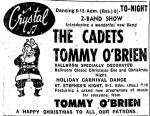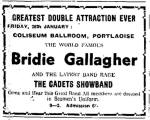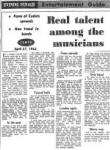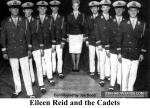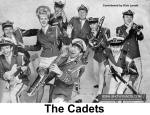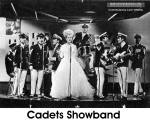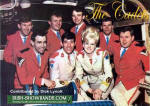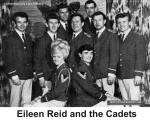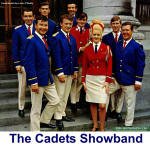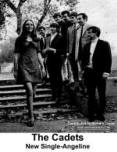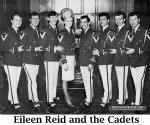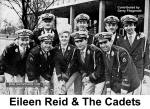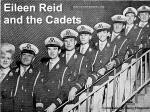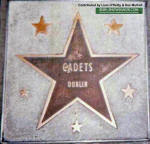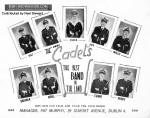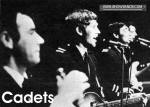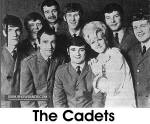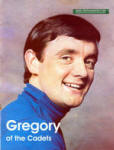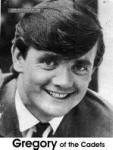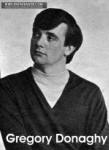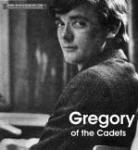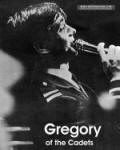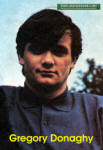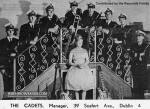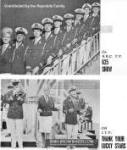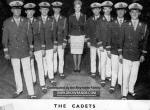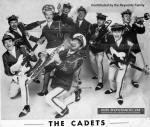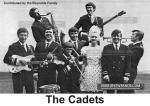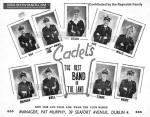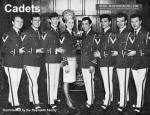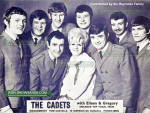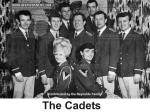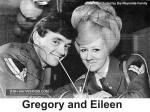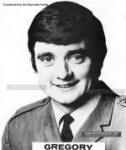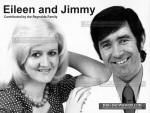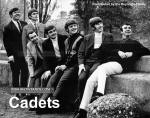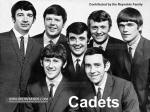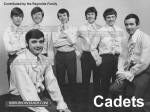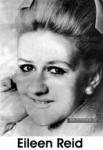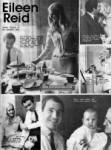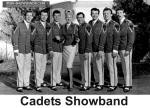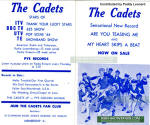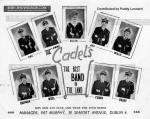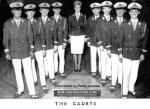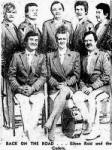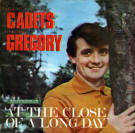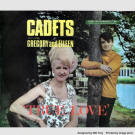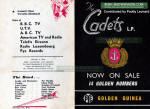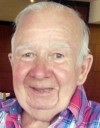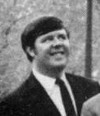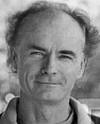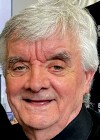The Corals / Cadets Showband (1961-1970)
Photo Gallery -
Band Lineups -
Discography
- Audio samples -
Where Are They Now?
Please note: some parts of this feature may not
yet be complete...but we are working on it!
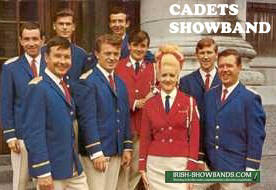 The Story
The Story
Some
showbands end up attracting a lot of attention and Eileen Reid and her Cadets
are one such band. Eileen, complete with her blonde beehive hairdo and
interesting costume choices (for the day) was really Ireland's first female
showband
superstar and was actually the only Irish female singer to have a number one hit
in the sixties with "Fallen Star."
Eileen had been playing around Dublin with The Melody
Makers, a local band that was moderately successful locally. Pat Murphy
picked up the story in the April 13, 1968 issue of Spotlight, "I began
organising the Cadets in October, 1961, but we didn't make our first appearance
until Christmas of that year."
Pat credits John Hardy of the Blue Clavons with
suggesting Eileen Reid to him and they went along to hear Eileen and
her band in Jacob's Hall. The nucleus of the band was The Melochords, another popular Dublin band
(and former band of Dickie Rock) and the band was first called the
Corals Showband. In May they were advertised to play the
Olympic Ballroom, but by December they were known as the Cadets.
However, Eileen was not a popular choice
with the band members as they wanted to bring back Dickie to front the new
band. Dickie had previously left The Melochords to form his own group,
The Echoes. Despite their protests, Tom Costello, the band's manager, knew promoters were looking for
something special and he went with Eileen. The original lineup of the Cadets
was: Eileen Reid (vocals), Pat
Murphy (harmonica), Jas Fagan (trombone), Gerry Hayes
(keyboards), Brendan O'Connell (guitar), Jimmy Day (sax/guitar), Noel McGann
(bass), and Ian McGarry
(drums). They opened on the 23rd of December in the Crystal Ballroom in Dublin
and a few nights later played St. Stephen's night in the Garda Club in Dublin.
At first, the band did not do well in Dublin
(although they played regularly in the Crystal Ballroom) and spent a year traveling around Ireland trying to make a break
through. They did well in the North though. Said Pat, "Inside a few
months we were among the top three bands in the North." The
Evening Herald's "Tempo" show business column reported that the
band was "the second greatest draw in the six counties-next to the
Royal Showband."
Within a year, Eileen started to date the
band's sax player, Jimmy Day, whom she would eventually marry. Like many of the early showbands, The Cadets got their
shot at international stardom and appeared on several TV shows in the U.K. On
July 13, 1963 they became the first Irish showband to appear on the ITV programme,
Thank Your Lucky Stars, sharing the stage with "newcomers" Mick Jagger and
The Rolling Stones. Eileen once recounted that Mick was really taken with
their snappy outfits. They made their Irish TV debut on The Showband Show.
During this period, they also toured America and were even given their own show on
Radio Eireann, called Carnival Time with the Cadets. Some time in early
1963, Gerry Hayes was replaced by Frank Nolan on keyboards.
 The band toured with Johnny and
June Cash when they came to Ireland in October, 1963. The highlight
of the tour was a concert in the National Stadium in Dublin. Eileen
and the Cadets were introduced as a major force in the Irish music
scene to The Beatles when they came to Dublin in November 1963. That
same year, the Cadets became one of the early showbands to
have a single released, Hello Trouble.
The band toured with Johnny and
June Cash when they came to Ireland in October, 1963. The highlight
of the tour was a concert in the National Stadium in Dublin. Eileen
and the Cadets were introduced as a major force in the Irish music
scene to The Beatles when they came to Dublin in November 1963. That
same year, the Cadets became one of the early showbands to
have a single released, Hello Trouble.
After the release of Hello Trouble on Decca,
the band switched to Pye Records and were soon number 1 in Ireland with their version of Jim Reevesí
Fallen Star. On May 25, 1964, Eileen became the
first, and only, 60's Showband female vocalist to have a number one hit on the Irish charts, and
the third showband overall, behind only the Royal and Miami to top the
Irish charts.
In late 1964, they charted with their most famous song, I Gave My
Wedding Dress Away. For this melancholy country ballad, Eileen
regularly appeared onstage dressed in a wedding dress, which caused
a minor sensation at the time.
In
late 1965, Patrick Murphy was replaced with singer,
Paul "Bat" Green, a move which gave the band more range
on stage, as well as a male counter to Eileen.
The band's first LP simply named
The Cadets was a capsule version of their stage act and featured
every vocal and instrumental talent that they had. Their next
release Are You Teasin' Me, was a hit in Ireland but did not make
any impression in Britain. The Cadets did however, make it into the British
charts for one week in June 1965 with Jealous Heart.
In April, 1966, even though Eileen was the number
one female vocalist in the country, management decided to replace male vocalist
Paul Green with
Gregory Donaghy from Sion Mills, Co. Tyrone (who had formerly been with the Polka
Dots), and he became the life and soul of the party. The band would
hit number one again in 1966, when Gregory topped the Irish charts with
More Than Yesterday only two months after joining the band.
The Cadets
were considered one of Ireland's showband royalty, and one of the top ten
showbands of the era, along with such legends as The Capitol, The Royal,
The
Miami, and The Clipper Carlton. The Cadets continued to tour the showband circuit
and notched up an impressive run of hits including Right Or Wrong, If I Had My
Life To Live Over, At The Close Of A Long Day and Land Of
Gingerbread.
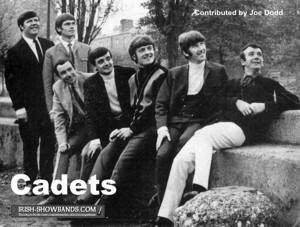 The
June 22, 1968 issue of Spotlight ran two conflicting blurbs about
Eileen's retirement from the Cadets. The first announced her final
Dublin appearance was scheduled for the Ierne Club on June 19th and
the second said her last gig with the band would be the Television
Club on June 22nd. In the article she warned other girls about
getting involved with the showband scene, "I would not recommend it
to any girl-unless they had a great bunch of lads like the Cadets to
work with, and then only for a few years." (6-22-68)
The
June 22, 1968 issue of Spotlight ran two conflicting blurbs about
Eileen's retirement from the Cadets. The first announced her final
Dublin appearance was scheduled for the Ierne Club on June 19th and
the second said her last gig with the band would be the Television
Club on June 22nd. In the article she warned other girls about
getting involved with the showband scene, "I would not recommend it
to any girl-unless they had a great bunch of lads like the Cadets to
work with, and then only for a few years." (6-22-68)
She and Jimmy were scheduled to be married on the 24th of June. After a rocky courtship, Jimmy and
Eileen finally got married and the following April, Eileen had her first
child, a daughter named Pamela.
The band continued on without her, and released several records, but
had no more records in the Irish Charts. By
early 1970
The Cadets were beginning to lose musical direction. Jimmy
decided that he had enough of traveling and went into his family's
taxi business and The Cadets were no more. Noel McGann (bass)
and Brendan O'Connell (guitar) teamed up with Johnny McEvoy and
formed a country band for the ballroom circuit. Eventually Jimmy and Eileen decided they would
do cabaret together. Jimmy had been working as a compere in cabaret
lounges around Dublin and had a three night a week residency in the
Central Lounge in Balbriggan. Jas Fagan and Paddy Burns formed the
Sun Valley Boys with Dennis Bowler taking up lead vocals with the
country band.
Although Eileen left the Irish scene for a
while in late 1971 she was back fronting a new band, 2nd Sound. For
several weeks in 1971 it was looking like Eileen would be joining
with George Kaye (Smokeys) to form a new band. After several weeks
of speculation George formed a four piece bluegrass band before
returning to join Pat Ely in the Rocky Tops. In the meantime, part
of his band joined with Eileen and 2nd Sound was formed. The
band featured Eileen on vocals along with husband Jimmy Day (sax), Joe Murray
(keyboards), Joe Holleran (guitar), Shay Cribben
(bass), Bobby Clarke (trumpet), Colm Graham (guitar) and Paddy
Higgins (drums).
Through the mid-seventies, Eileen and Jimmy
performed on the Dublin cabaret circuit, but she soon started to
perform in annual pantomimes in Dublin. During
the 1990s Eileen tried her hand at
acting and had small parts in The Commitments (1991), Against All
Odds, A Man of No Importance (1994), and Moll Flanders (1995). These
days, Eileen has her
own show on RTE radio.
Gregory Donaghy joined up with
Maisie McDaniel in the relatively short lived Nashville Ramblers (Maisie left
the band and it eventually folded in 1971/72) and then he formed a band
called The Gregory Trio (our thanks Dave
Fleming for the info) but he eventually emigrated to
Canada in 1974 where he joined The Carlton Showband, a Canadian band
which was started in 1963 by a group of Irish ex-patriots and
enjoyed a career that lasted until 1996 when the band finally
retired after 33 years and 34 albums to their credit. In the 90's he
released a solo album, Through the Eyes of an Irishman and he still lives and performs in Newfoundland.
These days, it seems like songs by
The Cadets
appear on more Irish Showband compilations than almost anyone else from the
era, a testament to their popularity. Unlike many of their
counterparts though (who were able to reinvented themselves and continue through the seventies and beyond), The Cadets called it quits
after less than a decade and,
much like the Beatles (who they once met), they live on today through
their music and memories only.
The band would go back on the road
for a time in 1987, but we don't know for how long.
*Some information for this article
from Send 'Em Home Sweatin' by Vincent Power.
Photo Gallery
Click on thumbnails for full images

 The Story
The Story The band toured with Johnny and
June Cash when they came to Ireland in October, 1963. The highlight
of the tour was a concert in the National Stadium in Dublin. Eileen
and the Cadets were introduced as a major force in the Irish music
scene to The Beatles when they came to Dublin in November 1963. That
same year, the Cadets became one of the early showbands to
have a single released, Hello Trouble.
The band toured with Johnny and
June Cash when they came to Ireland in October, 1963. The highlight
of the tour was a concert in the National Stadium in Dublin. Eileen
and the Cadets were introduced as a major force in the Irish music
scene to The Beatles when they came to Dublin in November 1963. That
same year, the Cadets became one of the early showbands to
have a single released, Hello Trouble.
 The
June 22, 1968 issue of Spotlight ran two conflicting blurbs about
Eileen's retirement from the Cadets. The first announced her final
Dublin appearance was scheduled for the Ierne Club on June 19th and
the second said her last gig with the band would be the Television
Club on June 22nd. In the article she warned other girls about
getting involved with the showband scene, "I would not recommend it
to any girl-unless they had a great bunch of lads like the Cadets to
work with, and then only for a few years." (6-22-68)
The
June 22, 1968 issue of Spotlight ran two conflicting blurbs about
Eileen's retirement from the Cadets. The first announced her final
Dublin appearance was scheduled for the Ierne Club on June 19th and
the second said her last gig with the band would be the Television
Club on June 22nd. In the article she warned other girls about
getting involved with the showband scene, "I would not recommend it
to any girl-unless they had a great bunch of lads like the Cadets to
work with, and then only for a few years." (6-22-68)